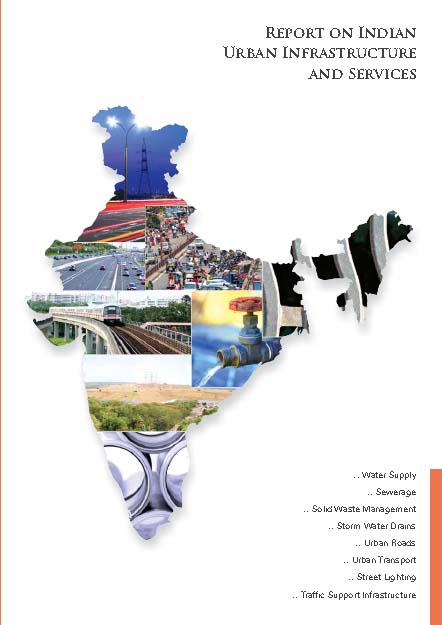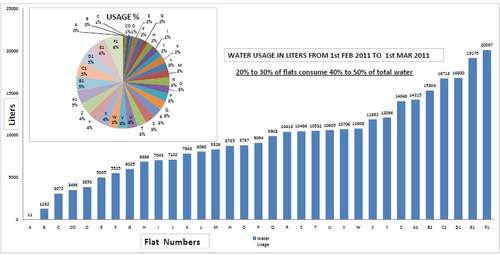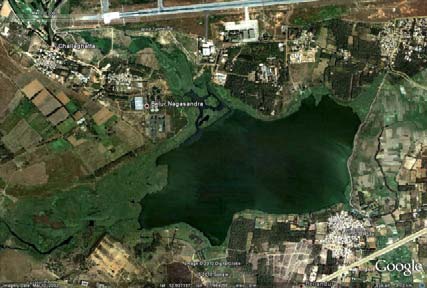/topics/urban-water
Urban Water
Estimating the investment requirements for urban infrastructure services – Report of the High Powered Expert Committee (HPEC)
Posted on 22 Mar, 2011 09:13 AM This report on Indian urban infrastructure and services is an outcome of the High Powered Expert Committee (HPEC) chaired by Isher Judge Ahluwalia set up by the Ministry of Urban Development in May, 2008 for estimating the investment requirement for urban infrastructure services. It is an inevitable outcome of the faster rates of growth to which the economy has now transited. Indeed, urbanisation is itself a process that will support growth. The Committee has made recommendations on how to deal with these challenges of urbanisation.
This report on Indian urban infrastructure and services is an outcome of the High Powered Expert Committee (HPEC) chaired by Isher Judge Ahluwalia set up by the Ministry of Urban Development in May, 2008 for estimating the investment requirement for urban infrastructure services. It is an inevitable outcome of the faster rates of growth to which the economy has now transited. Indeed, urbanisation is itself a process that will support growth. The Committee has made recommendations on how to deal with these challenges of urbanisation.
The Committee has held several meetings with officials from the Government of India, state governments and local governments and also met with academicians and other stakeholders such as Asian Development Bank with interest and expertise in Indian urban issues.
The report argues that the challenge of managing urbanisation will have to be addressed through a combination of increased investment, strengthening the framework for governance and financing, and a comprehensive capacity building programme at all levels of government. The Committee has projected very large investment requirements for providing public services to specified norms and also supporting the growth process. The challenge of financing these investments is inextricably linked with the challenge of governing the cities and towns of India.
Bengaluru lakes to get a facelift - Down To Earth
Posted on 16 Mar, 2011 04:41 PM
Bengaluru now has an actionplan to restore its waterbodies after the Karnataka High Court accepted the report of a committee appointed to prepare a framework for the preservation of the city's lakes. The court had appointed the committee headed by Justice NK Patil in November last year to examine the ground realities while formulating a framework for restoration of lakes.
Domestic water usage analysis for a 32 flat apartment in Bangalore - Kannan Venkitachalam
Posted on 08 Mar, 2011 10:10 AM

Initially used to buy 3-4 tankers per day with limited supply of water like in morning 1.5hrs., Noon 1 hr & Night 1.5hrs for the last 11 to 12 months. Now we have 24 hrs water and buying only 2 tankers per day.
Landmark initiative of Karnataka High Court stops the destruction and degeneration of lakes of Bangalore - ESG press release
Posted on 04 Mar, 2011 09:02 AMIn a landmark ruling today, the Hon’ble High Court of Karnataka accepted the report of a committee it constituted to examine the ground realities and prepare an action plan for the preservation of lakes in the city of Bangalore. This report was sought by an interim direction of Chief Justice Mr. J. S. Khehar and Justice A. S.
Lakes of Mahadevpura constituency of Bengaluru: Current status, changes in distribution and recommendations for restoration - A report by ATREE (2011)
Posted on 02 Mar, 2011 09:18 AM The lakes are now faced with the impacts of rapid urbanization and the Bruhat Bengaluru Mahanagara Palike (BBMP) has been consolidating management of the majority of the city’s lakes under its control in the recent years. The survey dealt with 35 lakes in 10 sub chains in Mahadevpura. The report describes current status, studies changes in extent, and suggests steps for reclamation and conservation.
The lakes are now faced with the impacts of rapid urbanization and the Bruhat Bengaluru Mahanagara Palike (BBMP) has been consolidating management of the majority of the city’s lakes under its control in the recent years. The survey dealt with 35 lakes in 10 sub chains in Mahadevpura. The report describes current status, studies changes in extent, and suggests steps for reclamation and conservation.
Urban Rainwater Harvesting'- bRAINstorming
Posted on 10 Feb, 2011 11:11 AMThe International Rainwater Harvesting Alliance newsletter for February 2011. Newsletter focuses on all activities concerning rainwater harvesting.
- Potential water availability from rainwater harvesting in India
Rainwater harvesting can play an important role in supplying urban dwellers with water. The impermeable roof surfaces that are widespread within a city, lend themselves perfectly to the collection of rainwater.
Urban water pricing: Setting the stage for reforms – A study by National Institute of Public Finance Policy
Posted on 31 Jan, 2011 08:22 PMIt underlines, in this regard, the importance of a responsible municipal fiscal and financial system, simplification of existing water pricing and tariff structures, and regulatory mechanisms which are able to balance the interests of the producers and consumers of urban services.
India Water Expo - 2011, 28th - 29th April 2011, Chennai
Posted on 25 Jan, 2011 10:22 AMClear Solution to Clean Water
Organizer: India Water Expo
Venue: Chennai Trade Centre, Chennai
India s groundwater challenges and the way forward
Posted on 18 Jan, 2011 11:42 PMIndia’s Groundwater Challenge and the Way Forward
P S Vijay Shankar , Himanshu Kulkarni , Sunderrajan Krishnan
The groundwater crisis is acquiring alarming proportions in many parts of the country. Strategies to respond to groundwater overuse and deteriorating water quality must be based on a new approach involving typologising the resource problems and redefining the institutional structure governing groundwater. This approach is based on the notion of groundwater as common property.
Maharashtra Groundwater (Development and Management) Bill (2009)
Posted on 05 Jan, 2011 07:32 PMThe Maharashtra Groundwater (Development and Management) Bill, 2009 aims to facilitate and ensure sustainable and adequate supply of groundwater of prescribed quality, for various category of users, through supply and demand management measures, protecting public drinking water sources and to establish the State Groundwater Authority and District Level Authorities to manage and to regulate, with community participation, the exploitation of groundwater within the State of Maharashtra.





